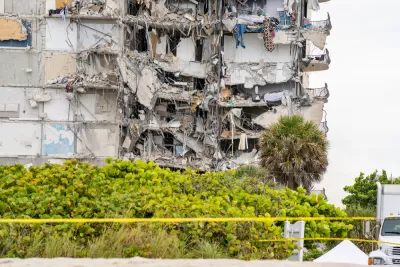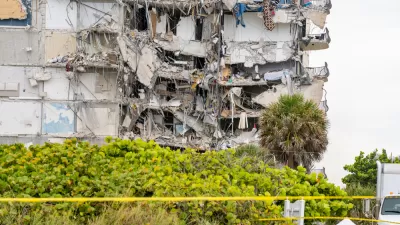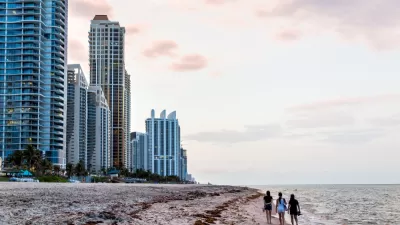Last year's Miami Beach condo collapse could portend more tragedy to come if developers don't address the risks of aging buildings and climate change.

In a deeply reported piece in The New York Times, Matthew Shaer examines the risks faced by Miami Beach's many high-rise condo buildings, a risk made painfully clear by the June 2021 collapse of a Surfside high-rise. With 98 fatalities, the collapse was "one of the deadliest engineering failures in the history of the United States."
According to James McGuinness, chief building official for Surfside, "This terrible tragedy, which is a national tragedy, is going to change the building codes as they relate to certification and all existing buildings." McGuinness warned that the soil that buildings are built on is an important factor, particularly in coastal zones where existing land is often shored up with infill.
But meaningful reform, of the kind McGuinness imagined, has long been notoriously hard to enact. Florida has roughly 1.5 million residential condo units — among the most of any state — and a highly lucrative condo and co-op industry with many powerful players, from management companies and developers to firms specializing in condo law. Historically, these groups, and the lobbyists who represent them, have successfully pushed back against any policy they view as constrictive or unduly expensive.
Built at the turn of the 20th century on a foundation of former mangrove swamps, Miami Beach is home to hundreds of aging buildings that face similar risks to Champlain Towers. Experts say the state must urgently strengthen regulations that hold developers accountable for the safety of their projects, regulations described in more detail in the source article. Many residents, Shaer writes, find themselves in a bind. "Median house prices are soaring; the real estate market is sloshing with investor cash. But the dangers of staying put are potentially even greater."
FULL STORY: The Towers and the Ticking Clock

Maui's Vacation Rental Debate Turns Ugly
Verbal attacks, misinformation campaigns and fistfights plague a high-stakes debate to convert thousands of vacation rentals into long-term housing.

Planetizen Federal Action Tracker
A weekly monitor of how Trump’s orders and actions are impacting planners and planning in America.

San Francisco Suspends Traffic Calming Amidst Record Deaths
Citing “a challenging fiscal landscape,” the city will cease the program on the heels of 42 traffic deaths, including 24 pedestrians.

Defunct Pittsburgh Power Plant to Become Residential Tower
A decommissioned steam heat plant will be redeveloped into almost 100 affordable housing units.

Trump Prompts Restructuring of Transportation Research Board in “Unprecedented Overreach”
The TRB has eliminated more than half of its committees including those focused on climate, equity, and cities.

Amtrak Rolls Out New Orleans to Alabama “Mardi Gras” Train
The new service will operate morning and evening departures between Mobile and New Orleans.
Urban Design for Planners 1: Software Tools
This six-course series explores essential urban design concepts using open source software and equips planners with the tools they need to participate fully in the urban design process.
Planning for Universal Design
Learn the tools for implementing Universal Design in planning regulations.
Heyer Gruel & Associates PA
JM Goldson LLC
Custer County Colorado
City of Camden Redevelopment Agency
City of Astoria
Transportation Research & Education Center (TREC) at Portland State University
Jefferson Parish Government
Camden Redevelopment Agency
City of Claremont





























